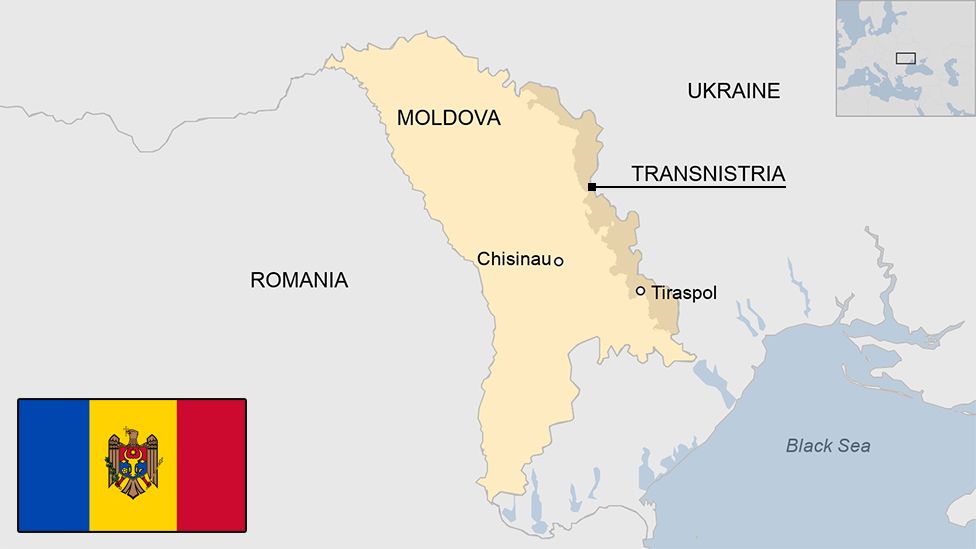Moldova country profile
- Published

Sandwiched between Romania and Ukraine, Moldova emerged as an independent republic following the collapse of the Soviet Union in 1991.
Moldova is one of the poorest countries in Europe, with its economy relying heavily on agriculture. Two-thirds of Moldovans are of Romanian descent, and the two countries share a common cultural heritage.
The industrialised territory to the east of the Dniester, generally known as Transnistria or the Dniester region, was formally an autonomous area within Ukraine before 1940, when the Soviet Union combined it with Bessarabia to form the Moldavian Soviet Socialist Republic.
This area is mainly inhabited by Russian- and Ukrainian-speakers. As people there became increasingly alarmed at the prospect of closer ties with Romania in the tumultuous twilight years of the Soviet Union, Transnistria unilaterally declared independence from Moldova in 1990.
Since Russia's invasion of Ukraine in 2022, Moldova's pro-Western and pro-Russian factions have become increasingly divided.
In May 2023, the southern Moldovan semi-autonomous region of Gagauzia elected a new local leader intent on improving ties with Moscow.
Officials from the country's pro-European government have suggested central authorities will try to annul the vote on the grounds of widespread irregularities.
- Read more country profiles - Profiles by BBC Monitoring
REPUBLIC OF MOLDOVA: FACTS
- Capital: Chisinau
- Area: 33,851 sq km
- Population: 2.6 million
- Languages: Romanian, also Bulgarian, Gagauz, Russian, Ukrainian
- Life expectancy: 67 years (men) 76 years (women)
LEADERS
President: Maia Sandu
President since November 2020. The former prime minister thwarted pro-Russian President Igor Dodon's attempt to win re-election.
A pro-European who failed to unseat Mr Dodon in 2016, Ms Sandu briefly headed a government in 2019, but it fell after dispute over the appointment of a prosecutor-general.
Prime Minister Dorin Recean
Dorin Recean became prime minster after the resignation of Natalia Gavrilita in February 2023, having headed the government since the 2021 parliamentary election when the pro-European Party of Action and Solidarity (PAS) ousted a pro-Russian coalition.
Speaking to journalists shortly after his nomination as prime minster, Recean named his three top priorities. "The first is discipline in government departments which must serve citizens and businesses. There is resistance to this, but we will overcome it.
"The second is breathing new life in the economy as soon as possible. This means finding more resources for investment in small and medium-size companies for them to create jobs, pay higher wages and work for our prosperity.
"The third is peace and prosperity. We must realise that we are facing the gravest threats and challenges since WW2. We must strengthen the security sector for everyone to feel safe."
MEDIA
The media have changed profoundly since the 2021 parliamentary election, which brought to power a pro-European government.
The government has made it easier for journalists to access to official information, contributing to Moldova's rise in the Reporters Without Borders media freedom ranking.
Since the Russian invasion of Ukraine in February 2022, parliament has effectively banned rebroadcasts of Russian TV news and political shows, and has set out punishments for supposed fake news.
Political battles between pro-Russia and pro-West camps are played out in the media.
TIMELINE
Some key dates in the history of Moldova:
14th-15th Centuries - Principality of Moldova stretches roughly between Carpathian mountains and Dniester river.
16th-early 19th Century - Moldovan territory disputed by several powers with the Ottoman Empire and Russia as the main rivals.
1812 - Treaty of Bucharest grants Russia control of eastern Moldova or Bessarabia, the area between the River Prut and the west bank of the Dniester. The Ottoman Empire gains control of western Moldova.
1878 - Ottomans recognise independence of Romanian state including western Moldova.
1918 - Following the Bolshevik revolution in Russia, Bessarabia declares independence. Its parliament calls for union with Romania.
1920 - Treaty of Paris recognises union of Bessarabia with Romania. The Bolsheviks do not.
1924 - Moldovan Autonomous Soviet Socialist Republic established east of the Dniester River within Ukraine.
1940 - Russia annexes Bessarabia from Romania, and combines it with most of the Moldovan Autonomous Soviet Socialist Republic to form Moldavian Soviet Socialist Republic.
1941-1945 - Romania re-establishes control after its ally Nazi Germany invades the Soviet Union until the end of World War Two, when the Soviet Union regains control.
Late 1980s - Resurgence of Moldovan nationalism in the wake of the Gorbachev reforms in the Soviet Union.
1991 - Moldova declares independence. It joins the Commonwealth of Independent States, the successor to the Soviet Union.
Up to 700 people are killed in fighting between Moldovan and Transnistrian forces following the breakaway region's unilateral declaration of independence.
1992 - Ceasefire signed and enforced by Russian troops already stationed in the breakaway region.
2006 - Transnistria referendum overwhelmingly backs independence from Moldova and a plan eventually to become part of Russia.
2014 - Moldova signs association agreement with the European Union, prompting Russia to impose import restrictions on the country's agricultural produce.
2016 - Pro-Russian candidate Igor Dodon wins first direct presidential election in 16 years.
2020 - Pro-European opposition candidate Maia Sandu is elected Moldova's first women president, defeating the incumbent pro-Russian president Igor Dodon.
- Published10 July 2023
- Published10 July 2023
- Published22 May 2023
- Published21 June 2023
- Published25 March